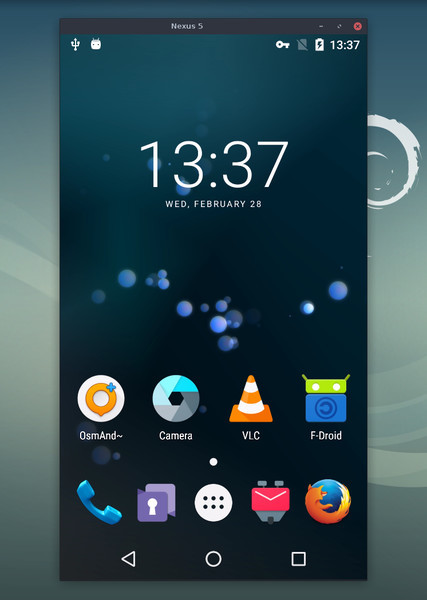This application provides display and control of Android devices connected on USB. It does not require any root access. It works on GNU/Linux, Windows and MacOS.
The Android part requires at least API 21 (Android 5.0).
You need adb (recent enough so that adb reverse is implemented, it works
with 1.0.36). It is available in the Android SDK platform
tools, on packaged in your distribution (android-adb-tools).
On Windows, just download the platform-tools and
extract the following files to a directory accessible from your PATH:
adb.exeAdbWinApi.dllAdbWinUsbApi.dll
Make sure you enabled adb debugging on your device(s).
The client requires FFmpeg and LibSDL2.
Install the required packages from your package manager.
# runtime dependencies
sudo apt install ffmpeg libsdl2-2.0.0
# client build dependencies
sudo apt install make gcc pkg-config meson \
libavcodec-dev libavformat-dev libavutil-dev \
libsdl2-dev
# server build dependencies
sudo apt install openjdk-8-jdk# enable RPM fusion free
sudo dnf install https://download1.rpmfusion.org/free/fedora/rpmfusion-free-release-$(rpm -E %fedora).noarch.rpm
# client build dependencies
sudo dnf install SDL2-devel ffms2-devel meson gcc make
# server build dependencies
sudo dnf install javaTwo AUR packages have been created by users:
For Windows, for simplicity, a prebuilt archive with all the dependencies
(including adb) is available:
scrcpy-windows-with-deps-v1.1.zip.
(SHA-256: 27eb36c15937601d1062c1dc0b45faae0e06fefea2019aadeb4fa7f76a07bb4c)
(It's just a portable version including dll copied from MSYS2.)
Instead, you may want to build it manually. You need MSYS2 to build the project. From an MSYS2 terminal, install the required packages:
# runtime dependencies
pacman -S mingw-w64-x86_64-SDL2 \
mingw-w64-x86_64-ffmpeg
# client build dependencies
pacman -S mingw-w64-x86_64-make \
mingw-w64-x86_64-gcc \
mingw-w64-x86_64-pkg-config \
mingw-w64-x86_64-mesonJava (>= 7) is not available in MSYS2, so if you plan to build the server,
install it manually and make it available from the PATH:
export PATH="$JAVA_HOME/bin:$PATH"Use Homebrew to install the packages:
# runtime dependencies
brew install sdl2 ffmpeg
# client build dependencies
brew install gcc pkg-config mesonJava (>= 7) is not available in Homebrew, so if you plan to build the server,
install it manually and make it available from the PATH:
export PATH="$JAVA_HOME/bin:$PATH"Install the Android SDK (Android Studio), and set ANDROID_HOME to
its directory. For example:
export ANDROID_HOME=~/android/sdkClone the project:
git clone https://github.com/Genymobile/scrcpy
cd scrcpyThen, build:
meson x --buildtype release --strip -Db_lto=true
cd x
ninjaYou can test it from here:
ninja runOr you can install it on the system:
sudo ninja install # without sudo on WindowsThis installs two files:
/usr/local/bin/scrcpy/usr/local/share/scrcpy/scrcpy-server.jar
Just remove them to "uninstall" the application.
Since the server binary, that will be pushed to the Android device, does not depend on your system and architecture, you may want to use the prebuilt binary instead:
scrcpy-server-v1.1.jar.
(SHA-256: 14826512bf38447ec94adf3b531676ce038d19e7e06757fb4e537882b17e77b3)
In that case, the build does not require Java or the Android SDK.
Download the prebuilt server somewhere, and specify its path during the Meson configuration:
meson x --buildtype release --strip -Db_lto=true \
-Dprebuilt_server=/path/to/scrcpy-server.jar
cd x
ninja
sudo ninja installAt runtime, adb must be accessible from your PATH.
If everything is ok, just plug an Android device, and execute:
scrcpyIt accepts command-line arguments, listed by:
scrcpy --helpFor example, to decrease video bitrate to 2Mbps (default is 8Mbps):
scrcpy -b 2MTo limit the video dimensions (e.g. if the device is 2540×1440, but the host screen is smaller, or cannot decode such a high definition):
scrcpy -m 1024If several devices are listed in adb devices, you must specify the serial:
scrcpy -s 0123456789abcdefTo run without installing:
./run x [options](where x is your build directory).
| Action | Shortcut |
|---|---|
| switch fullscreen mode | Ctrl+f |
| resize window to 1:1 (pixel-perfect) | Ctrl+g |
| resize window to remove black borders | Ctrl+x | Double-click¹ |
click on HOME |
Ctrl+h | Middle-click |
click on BACK |
Ctrl+b | Right-click² |
click on APP_SWITCH |
Ctrl+m |
click on VOLUME_UP |
Ctrl++ |
click on VOLUME_DOWN |
Ctrl+- |
click on POWER |
Ctrl+p |
| turn screen on | Right-click¹ |
| paste computer clipboard to device | Ctrl+v |
| enable/disable FPS counter (on stdout) | Ctrl+i |
¹Double-click on black borders to remove them.
²Right-click turns the screen on if it was off, presses BACK otherwise.
A colleague challenged me to find a name as unpronounceable as gnirehtet.
strcpy copies a string; scrcpy copies a screen.
See the FAQ.
Read the developers page.
Copyright (C) 2018 Genymobile
Licensed under the Apache License, Version 2.0 (the "License");
you may not use this file except in compliance with the License.
You may obtain a copy of the License at
http://www.apache.org/licenses/LICENSE-2.0
Unless required by applicable law or agreed to in writing, software
distributed under the License is distributed on an "AS IS" BASIS,
WITHOUT WARRANTIES OR CONDITIONS OF ANY KIND, either express or implied.
See the License for the specific language governing permissions and
limitations under the License.
